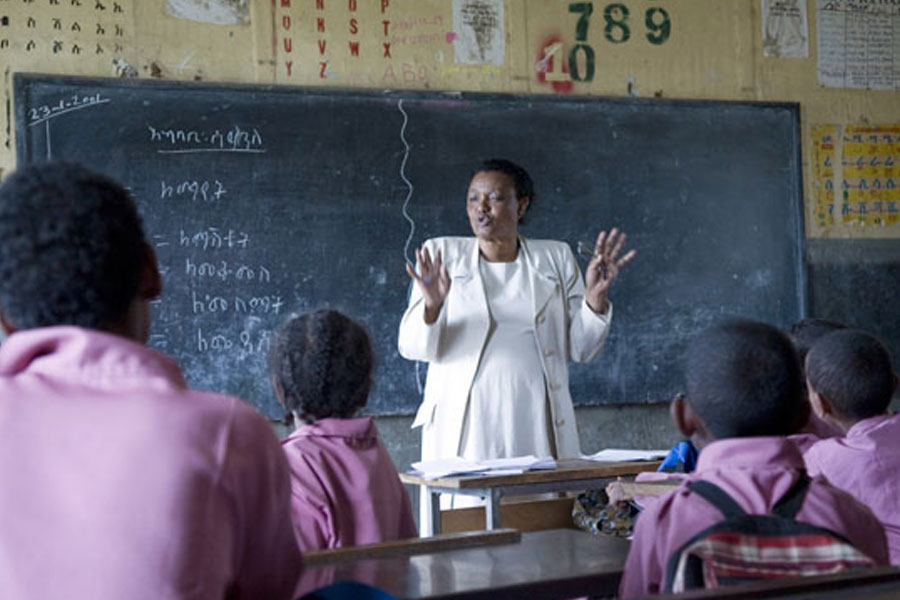
Nov 4 , 2023
By Dawit Tadesse
In the wake of the recent announcement by senior officials of the Ministry of Education detailing the results of the Grade 12 National Exam, the country found itself stunned by a startling revelation: only 3.3pc of students surpassed the halfway mark. This has ignited fervent public discussions, from humorous social media banter to in-depth intellectual deliberations.
Insiders in academia were unsurprised. The underlying crisis is not about these numbers but the long-term implications of the country's educational strategies. Multiple research over the years has identified the gaps in primary and secondary education. Yet, substantive actions, grounded in these findings, remain lacking. As the adage goes, one cannot reap where they have not sown.
However, to portray a single exam's outcome as the definitive metric of an educational system's health, as some officials from the Ministry insinuate, might be overly simplistic. A more comprehensive evaluation should encompass several factors, including exam quality, teacher efficiency, and resource availability.
The Ministry's current redressal plan for this academic debacle has raised eyebrows in certain quarters. Their move towards expanding boarding schools across the country, driven by the logic that current boarding school students have shown exemplary performance in the 12th-grade national exam, has not been universally lauded. Critics argue that most attendees at these boarding institutions were already academically robust, generating debate on this solution's effectiveness.
The more significant issue at stake, perhaps, is the holistic impact of boarding schools on the youth. Globally, the boarding school model is undergoing scrutiny. While these institutions undeniably strengthen academic focus by substituting home time with school hours, their broader socio-emotional consequences remain under-researched. Education, after all, extends beyond rote learning. It is about imbibing life skills from both formal and societal structures.
While boarding schools have been known to churn out academically successful students, questions about the emotional and psychological toll persist.
Several studies underscored the indispensable value of familial settings in nurturing well-rounded individuals. Within the familial cocoon, children learn core values and life lessons, experiencing sibling bonds, respect for elders, and a sense of rootedness. Boarding schools, even with the most dedicated faculty, cannot replicate this organic learning environment. The absence of immediate emotional support can often leave students feeling isolated, with limited avenues to voice their anxieties or concerns.
A boarding school education might accelerate independence at an age when children are not necessarily equipped to manage it. The premature distancing from family might inadvertently expose students to unsavoury habits or influences. The term 'homesickness', commonly bandied about in this context, barely scratches the surface of the complex emotional maelstrom experienced by many. The layered trauma of abrupt detachment from family, amplified by recurrent bouts of estrangement each time they return home, can be debilitating.
Such ruptured attachments can often manifest in adult life, exhibiting trust issues, a constant undercurrent of anticipated abandonment, and a pronounced emotional duality. The residual psychological impact cannot be brushed aside.
Considering this, is the expansion of boarding schools the most reasonable strategy for Ethiopia?
While such a move might seem tempting given the recent exam results, the long-term consequences, both emotional and societal, should warrant deeper contemplation. Education officials, in partnership with regional stakeholders, should weigh the full spectrum of implications before embarking on any substantial expansion. A more holistic approach, balancing academic rigour with emotional well-being, maybe the key to securing Ethiopia's educational future.
This strategy does not mean dismissing the idea of boarding schools altogether. On the contrary, these institutions have much to offer.
While boarding schools offer an immersive environment for learning, they should not be viewed in isolation. A multi-pronged approach is essential. Besides enhancing infrastructure, there is a dire need for teacher training programs that can usher in a new era of pedagogical methods. These methods should marry traditional learning with digital tools, making education more interactive and relevant to the 21st-century student.
Boarding schools can be crucial in areas with limited educational infrastructure or where students face long commutes. They provide not just an academic sanctuary but also a stable environment conducive to learning. For students who have showcased an aptitude for specific disciplines or need a specialised educational focus, boarding schools can offer the required intensity and tailor-made curricula. The sense of camaraderie, discipline, and structure that boarding schools provide can benefit many students, shaping them into responsible adults.
However, a nationwide expansion must be undertaken with discretion. Introducing boarding schools as a panacea for the educational woes the country faces might be a hasty decision. A nuanced approach, which involves assessing individual community needs, is essential. For instance, cities with robust educational infrastructures might benefit more from increased teacher training, curriculum reforms, and technological integration than from the introduction of new boarding schools.
If the officials proceed with this plan, these institutions must evolve to address the socio-emotional concerns. Programs that allow for regular familial interactions, mentoring systems that replicate family support, and psychological counselling can go a long way in ensuring the emotional well-being of students.
In tandem, community involvement is vital. The local community, parents, and educational stakeholders should have a voice in the running and regulation of these institutions. Such a participatory approach ensures the schools remain rooted in Ethiopian values and customs, fostering a sense of belonging among students.
PUBLISHED ON
Nov 04,2023 [ VOL
24 , NO
1227]


Radar | Jun 15,2019

Radar | May 06,2023

Sunday with Eden | Mar 25,2023

Editorial | Jan 28,2023

Agenda | Jun 08,2024

Radar | Jun 07,2025

My Opinion | Sep 28,2024

Agenda | May 31,2025

View From Arada | Jan 24,2021

Fortune News | Sep 10,2021

My Opinion | 131451 Views | Aug 14,2021

My Opinion | 127803 Views | Aug 21,2021

My Opinion | 125783 Views | Sep 10,2021

My Opinion | 123419 Views | Aug 07,2021

Dec 22 , 2024 . By TIZITA SHEWAFERAW
Charged with transforming colossal state-owned enterprises into modern and competitiv...

Aug 18 , 2024 . By AKSAH ITALO
Although predictable Yonas Zerihun's job in the ride-hailing service is not immune to...

Jul 28 , 2024 . By TIZITA SHEWAFERAW
Unhabitual, perhaps too many, Samuel Gebreyohannes, 38, used to occasionally enjoy a couple of beers at breakfast. However, he recently swit...

Jul 13 , 2024 . By AKSAH ITALO
Investors who rely on tractors, trucks, and field vehicles for commuting, transporting commodities, and f...

Jun 28 , 2025
Meseret Damtie, the assertive auditor general, has never been shy about naming names...

Jun 21 , 2025
A well-worn adage says, “Budget is not destiny, but it is direction.” Examining t...

Jun 14 , 2025
Yet again, the Horn of Africa is bracing for trouble. A region already frayed by wars...

Jun 7 , 2025
Few promises shine brighter in Addis Abeba than the pledge of a roof for every family...

Jun 29 , 2025
Addis Abeba's first rains have coincided with a sweeping rise in private school tuition, prompting the city's education...

Jun 29 , 2025 . By BEZAWIT HULUAGER
Central Bank Governor Mamo Mihretu claimed a bold reconfiguration of monetary policy...

Jun 29 , 2025 . By BEZAWIT HULUAGER
The federal government is betting on a sweeping overhaul of the driver licensing regi...

Jun 29 , 2025 . By NAHOM AYELE
Gadaa Bank has listed 1.2 million shares on the Ethiopian Securities Exchange (ESX),...